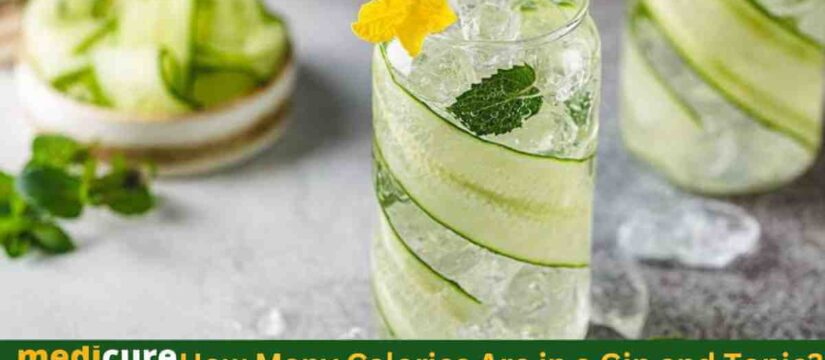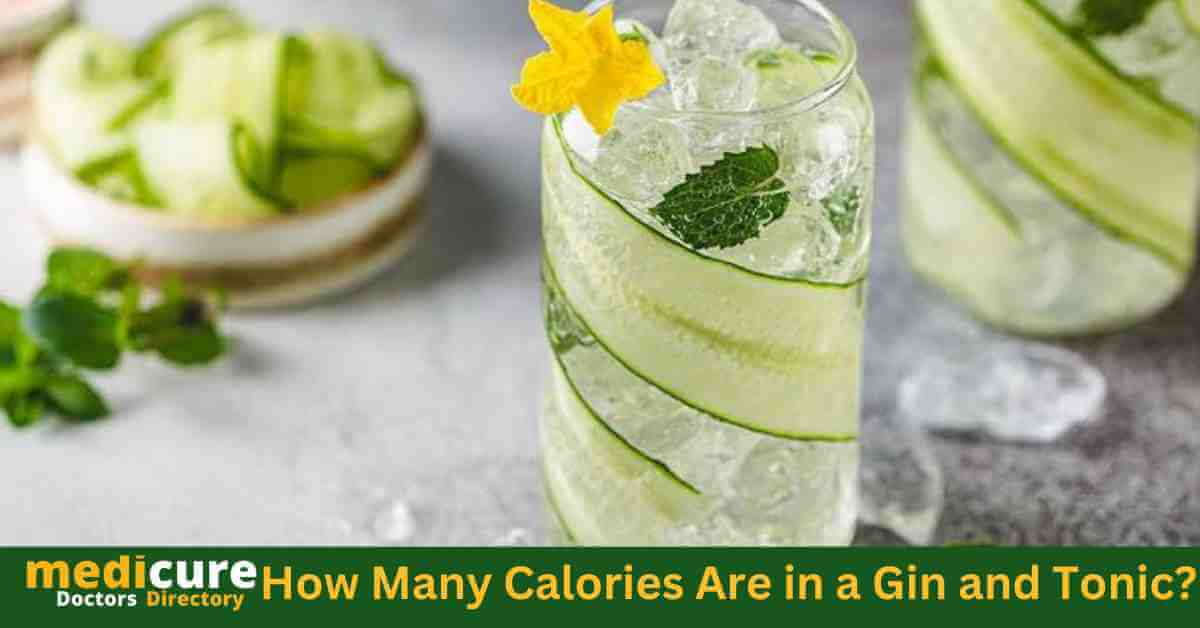MediCure

How Many Calories Are in a Gin and Tonic ?
- June 3, 2023
- 0 Likes
- 0 Comments
Introduction
How Many Calories Are in a Gin and Tonic ? A typical gin and tonic contains approximately 180 calories. The calorie content can vary depending on the specific brands, measurements, and mixers used. By choosing lower-calorie alternatives such as diet tonic water or soda water and being mindful of the quantity of gin and sugary garnishes, you can enjoy a refreshing gin and tonic without compromising on taste while managing your calorie intake.
Thank you for reading this post, don't forget to subscribe!How Many Calories Are in a Gin and Tonic?
Gin and tonic is a classic and widely popular cocktail enjoyed by many around the world. A reviving and flexible beverage has turned into a staple in bars and families the same. In the event that you’re cognizant about your calorie consumption, you could consider the number of calories that are in a gin and tonic. In this article, we’ll investigate the calorie content of this cherished beverage and furnish you with a valuable data to assist you with pursuing informed decisions.
How Many Calories Are in a Gin and Tonic?
Gin and tonic has gained immense popularity as a go-to cocktail for various occasions. It’s valued for its unmistakable taste as well as respected for its effortlessness. Nonetheless, for the people who watch out for their calorie utilization, realizing the calorie content of their number one beverages is essential.
What is a Gin and Tonic?
Before we dive into the calorie content, we should comprehend what a gin and tonic really is. A gin and tonic is a blended beverage that consolidates gin, a soul refined from juniper berries and different botanicals, with carbonated water. The combination is regularly decorated with a cut of lime or lemon and served over ice.
Calories in Gin
To determine the calorie count in a gin and tonic, it’s essential to consider the calories in the singular components is fundamental. Gin itself contains calories, albeit the sum can fluctuate contingent upon the brand and explicit sort. Overall, a standard serving of gin (1.5 ounces or 44 ml) contains roughly 97 calories. Actually quite important gin is moderately low in calories contrasted with other cocktails like brew and wine.
Calories in Tonic Water
The other significant component of a gin and tonic is the tonic water. While tonic water is known for its distinct bitter taste, it does contain calories. The calorie content in tonic water can vary between brands and even between regular and diet versions. On average, an 8-ounce (237 ml) serving of regular tonic water contains around 83 calories.
Total Calories in a Gin and Tonic
To determine the total calorie count in a gin and tonic, we need to combine the calories in gin and tonic water. Let’s consider a standard serving size of 1.5 ounces (44 ml) of gin and an 8-ounce (237 ml) serving of tonic water.
- Calories in gin (1.5 ounces): 97 calories
- Calories in tonic water (8 ounces): 83 calories
By adding these values together, we find that a typical gin and tonic contains approximately 180 calories. It’s important to note that the calorie count may vary slightly based on the specific brands and measurements used.
Impact of Mixers on Calorie Content
While gin and tonic are the primary elements of this mixed drink, it’s worth focusing on that the decision of blender can likewise affect the calorie content. A few people might like to utilize various blenders, for example, soft drink water or seasoned carbonated drinks, which can have differing carbohydrate levels.
While settling on a blender, prudent to pick choices are lower in calories to decrease the general calorie consumption. Diet carbonated water is a well known other option, as it contains essentially less calories than normal carbonated water. Moreover, utilizing soft drink water or shimmering water as a blender can additionally lessen the calorie content.
Tips for Reducing Calorie Intake
If you’re concerned about the calorie content of your gin and tonic yet don’t have any desire to think twice about taste, here are a few hints to assist you with partaking in a lower-calorie form:
1. Opt for diet tonic water:
As mentioned earlier, diet tonic water is a great option for reducing the calorie content of your drink without sacrificing the flavor. It typically contains little to no calories.
2. Use soda water or sparkling water:
Instead of tonic water, consider using soda water or sparkling water as a mixer. These options are usually calorie-free and can add a refreshing fizz to your cocktail.
3. Control the amount of gin:
Be mindful of the amount of gin you pour into your drink. Using a jigger or measuring cup can help you maintain a standard serving size and keep the calorie count in check.
4. Limit sugary garnishes:
While a cut of lime or lemon adds a wonderful touch to your gin and tonic, be wary of sweet embellishments or syrups. These increments can add to the general calorie content, so use them sparingly or choose a bit of citrus all things being equal.
5. Enjoy in moderation:
Recall that control is key with regards to cocktails. It’s vital to consume gin and tonics capably and be aware of your general calorie admission from all sources.
How Many Calories Are in a Gin and Tonic?

Importance of Moderation
While talking about the calorie content of gin and tonic, featuring the meaning of polishing off cocktails in moderation is fundamental. Over the top liquor utilization can negatively affect wellbeing and prosperity. It’s prescribed to keep rules given by wellbeing associations in regards to liquor utilization limits and to constantly drink mindfully.
FAQs
How Many Calories Are in a Gin and Tonic ?
1. Can I drink gin and tonic if I’m on a diet?
Yes, you can include gin and tonic in your diet. However, it’s important to consider the calorie content and choose lower-calorie options to fit your dietary goals.
2. Is it better to opt for diet tonic water?
Opting for diet tonic water can significantly reduce the calorie content of your gin and tonic. If you’re watching your calorie intake, it’s a preferable choice.
3. How can I make a low-calorie gin and tonic without compromising on taste?
To make a low-calorie gin and tonic without compromising taste, consider the following tips:
1. Choose a low-calorie mixer:
Opt for diet tonic water or soda water as a mixer. These options are lower in calories compared to regular tonic water and can still provide a refreshing taste.
2. Use fresh citrus:
Instead of relying on sugary garnishes or syrups, use fresh slices of lime, lemon, or even grapefruit to add a burst of flavor to your drink. Citrus fruits are naturally low in calories and offer a tangy twist.
3. Control your portions:
Be mindful of the amount of gin you pour into your glass. Using a jigger or measuring cup can help you maintain a standard serving size and keep the calorie count in check.
4. Avoid sweeteners:
Steer clear of adding extra sweeteners or syrups to your gin and tonic. These can significantly increase the calorie content. If you desire a touch of sweetness, consider using a low-calorie sweetener or muddling fresh fruit into the drink.
5. Experiment with herbs and botanicals:
Add depth to your gin and tonic by incorporating fresh herbs like mint, basil, or rosemary. These aromatic additions can upgrade the general flavor without adding huge calories.
Keep in mind, the objective is to track down a harmony between partaking in your beverage and being aware of your calorie consumption. With a touch of inventiveness and trial and error, you can make a flavorful, low-calorie gin and tonic that suits your taste inclinations.
4. Are there any health benefits associated with gin and tonic?
While moderate alcohol consumption has been connected to specific medical advantages, it’s essential to take note of that these advantages are frequently connected with moderate red wine utilization instead of gin and tonic explicitly. The key is control. Unreasonable liquor utilization can prompt negative wellbeing impacts, so it’s in every case best to drink capably and inside suggested limits.
5. Can the calorie content in gin and tonic vary based on the brand?
Yes, the calorie content can vary based on the brand of gin and tonic water used. Different brands may have slightly different formulations and variations in calorie counts. It’s a good practice to check the nutrition labels or online resources for specific brand information if you require precise calorie calculations.
How Many Calories Are in a Gin and Tonic?
Keep in mind, partaking in a gin and tonic can be important for a reasonable way of life. By being aware of your decisions and remembering balance, you can appreciate this exemplary mixed drink while dealing with your calorie admission. Cheers to a refreshing and responsible enjoyment of gin and tonic!